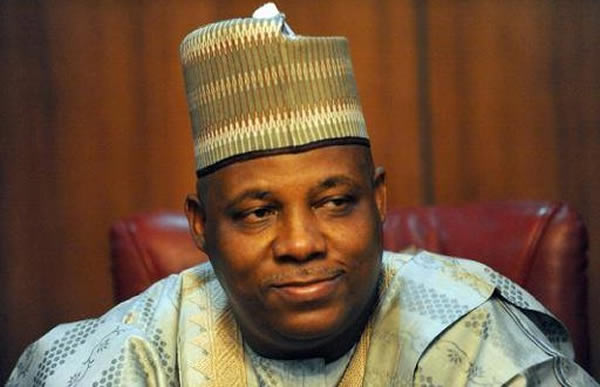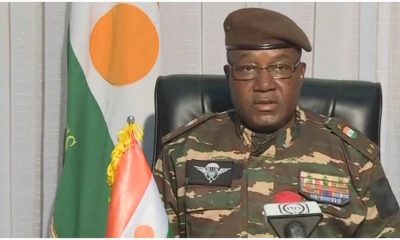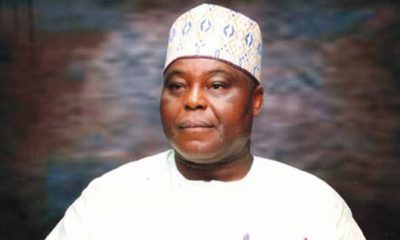News
The Erosion of Democracy: Partisan Appointments in INEC and Senate’s Betrayal

News
Zamfara Gov Dauda Lawal accuses predecessor Matawalle of complicity in banditry, fund mismanagement

The Governor of Zamfara State, Dauda Lawal, has alleged that his predecessor, Bello Matawalle, was fully involved in banditry issues plaguing the state.
He made the allegation while speaking on a TVC politics programme on Wednesday night and claimed that, based on information at his disposal, his predecessor led a government that was complicit with bandits.
Lawal also accused the previous administration, headed by Bello who is now the Minister of State for Defence, of misappropriating state funds and handling insecurity with leniency.
“Yes, there were a lot of issues in the past with my predecessor. In fact, let me state this very categorically: if I were him (Matawalle), I would resign and face all the allegations against me, which would have been more honourable. From all the information we are receiving, my predecessor (Matawalle) was fully involved in some of these banditry issues,” Lawal stated.
Justifying his claim that his predecessor was implicated in the banditry, he recounted how a permanent secretary under Matawalle’s administration paid ransom through the Government House to secure the release of his children, who had been abducted by bandits.
The governor said, “A typical example is the permanent secretary whose children were abducted, and it was unfortunate that he had to pay ransom through the Government House. It was also very clear, based on all the allegations, that bandits were being sheltered at the Government House. And there were many other issues.”
He added that, if he were Matawalle, he would have resigned to clear his name of all allegations.
“So, for me, honestly, if I were him, I would step aside and face these allegations until my name is cleared, before returning to continue my job. How can you imagine such allegations against him, and yet he remains the Minister of Defence? I mean, that is unfair. This man could have been honourable, stepped aside, faced the allegations, cleared his name, and then come back to continue his job,” Lawal stated.
He added that his predecessor’s file was before the Economic and Financial Crimes Commission and expressed surprise that the same person had been cleared by lawmakers and security agencies for the post of minister.
“In May 2023, there was an allegation of misappropriating over ₦70 billion, and when we took over, we realised that ₦70 billion was a small fraction compared to the rot on the ground. All this information was before the EFCC, and I wondered how this man was cleared by the security agencies before being confirmed as a minister. If I were him, I would face the EFCC and say, ‘Look, let me clear my name.’
“This is a man with 41 children, and for goodness’ sake, what kind of legacy is he going to leave for his children when he is being accused of misappropriating such a large sum? He should have come forward, faced the EFCC, and cleared his name.
“But we are still waiting to hear from the EFCC, and the case has been ongoing for over a year now. Meanwhile, this is the people’s money we are talking about. We need this money in Zamfara with all the challenges we are facing, including financial constraints. At the very least, let’s recover some of this money for Zamfara so that we can work for the people of the state,” Lawal concluded.
News
Iran’s Ambassador loses eye in deadly pager attacks

Mojtaba Amani, Iran’s ambassador to Lebanon, suffered severe injuries, including the loss of an eye, after a pager exploded in his face during a deadly attack in Lebanon.
Hand-held radios and pagers used by Hezbollah militants detonated across southern Lebanon.
The incident resulted in one of the country’s deadliest days since cross-border clashes with Israel began nearly a year ago.
The attacks killed at least 14 people and wounded hundreds, including mourners at a funeral.
Witnesses reported widespread panic, with ambulances rushing to emergency rooms and people screaming in pain.
The explosions targeted Hezbollah communication devices, sparking fears of further escalation in the region.
Hezbollah has vowed to retaliate against Israel, alleged to be behind the attacks.
The incident has heightened tensions between Israel and Hezbollah, with concerns about a potential regional war.
News
VP Shettima seeks close collaboration among MDAs, as NCP ratifies BPE’s 2021, 2022 audited financial reports.

Senator Kashim Shettima, the Vice President of Nigeria, has urged close collaboration among ministries, departments and agencies (MDAs) of government to actualise the agenda of President Bola Ahmed Tinubu across different sectors.
This is coming as the National Council on Privatization (NCP) chaired by the Vice President on Wednesday ratified the 2021 and 2022 audit financial reports of the Bureau of Public Enterprises (BPE).
The Council also approved the progress made so far by the BPE in the implementation of its 2024 work plan aimed at strengthening its operations.
The Council’s approvals were among the decisions taken at the 3rd meeting of the NCP chaired by Vice President Shettima at the Presidential Villa, Abuja.
A statement by Stanley Nkwocha, Senior Special Assistant to the President on Media and Communications (Office of the Vice President) which was sent to Nationwide Reports stated that the Council also directed the BPE to further engage with the relevant parties in the resolution of the dispute in the sale of the Sapele II (Ogorode Generation Company Ltd) and the sale of coal blocks belonging to the Nigerian Coal Corporation.
In his remarks during the meeting, the Vice President commended the new management of the BPE for its diligence and renewed vision, urging stakeholders to support the realization of the bureau’s set objectives.
He particularly commended the agency for its close supervision and conclusion of the Zungeru Hydroelectric Power Plant concession, as well as efforts to establish an Independent System Operator.
Senator Shettima further tasked the agency to work with the various committees of the NCP and the Ministry of Justice, and come up with a robust road map to expedite the completion of outstanding transactions, in the interest of the nation.
The Vice President noted that making important decisions in the power sector would be critical to tackling the perennial issues in the country’s energy industry.
Presenting a progress report on the 2024 work plan of the BPE, the Director General, Mr Ayodeji Gbeleyi, reported that the Bureau generated the sum of N93.47 billion in the first and second quarters of the year 2024 from three transactions, representing 35.9% of the expected revenues during the period under review.
The DG highlighted measures adopted by the agency to improve its operations such as the strengthening of concession management capacity, reinvigoration of post-transaction management capacity for effective performance and the deployment of best practices in reform optimization of public enterprises.
Also present at the meeting were Minister of Finance and Coordinating Minister for the Economy, Mr Wale Edun; Minister of Agriculture and Food Security, Sen. Abubakar Kyari; Minister of Budget and Economic Planning, Sen. Abubakar Bagudu; Minister of Power, Mr Adebayo Adelabu; Solicitor General of the Federation & Permanent Secretary, Ministry of Justice, Mrs Beatrice Jedy-Agba; Permanent Secretary, Ministry of Communication, Engr Faruk Yabo, and the representative of the CBN Governor among others.
-

 News1 year ago
News1 year agoBreaking: Tinubu’s authentic ministerial nominees
-

 News1 year ago
News1 year ago“Anytime we want to kill terrorists, President would ask us to take permission from France but they were killing our soldiers-” Niger Republic coup leader
-

 News11 months ago
News11 months ago“I’m leaving the Catholic church because Bishop Onah is oppressing me,” says Okunerere
-

 News1 year ago
News1 year agoDokpesi and the Gazebo Mystique
-

 News1 year ago
News1 year agoRadio Nigeria’s veteran broadcaster Kelvin Ugwu dies three months after retirement from service
-

 News5 months ago
News5 months agoPersons against Allagoa’s reforms behind protests at NSITF
-

 News1 year ago
News1 year agoTsunami: Tinubu orders dissolution of managements, boards of MDAs, to sack all Buhari’s political appointees
-

 News1 year ago
News1 year agoLast minutes fever: Nigerian Hunters Service optimistic as Buhari signs five Bills into law

